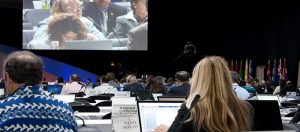CITES is one of the international platforms where Sea Save Foundation wages a battle to protect threatened and endangered marine species from extinction.
Unregulated international trade in plants and animals threatens the survival of many species. Since 2013, our advocacy at CITES has helped secure protection for vulnerable marine species critical to a healthy ocean ecosystem.
 CITES is the Convention on International Trade in Endangered Species of Wild Fauna and Flora. It is a voluntary agreement between governments that regulates international trade in wild animals and plants to prevent over-exploitation and help ensure the continued survival of vulnerable species.
CITES is the Convention on International Trade in Endangered Species of Wild Fauna and Flora. It is a voluntary agreement between governments that regulates international trade in wild animals and plants to prevent over-exploitation and help ensure the continued survival of vulnerable species.
While CITES has no authority over how plants and animals are managed within a country’s borders, it does affect how the species (dead or alive) are treated at border crossings.
Every three years, delegates from member countries meet at the Conference of the Parties (CoP CITES) to discuss proposed species and vote on a level of protection for each. At that time, species may be added to one of three appendices, which reflect that species’ level of endangerment, and determines what sanctions may be imposed on countries that consistently fail to prevent illegal trade of plants and animals in that category. More about CITES.
 Sea Save attends these high-level international meetings to advocate specifically for marine animals.
Sea Save attends these high-level international meetings to advocate specifically for marine animals.
We work with other nongovernmental organizations, scientists, and country delegates to study any proposals affecting marine life, and to explore the science and policy surrounding each species. Then we translate that complex scientific and economic data into simple, country-specific materials to inform delegates.
We also meet directly with delegates to help them understand why targeted species are important to protect, how losing a species might impact their countries, and why protecting a species is beneficial to a country in the long term.
Finally, Sea Save serves as a watchdog, reporting on the events of the conference, and documenting attempts at bribery or other illicit efforts to undermine protections. In that way, we help ensure that the process is transparent, fair, and productive.
Sea Save’s advocacy at every CITES treaty meeting for more than a decade — at CoP16, CoP17, and CoP18 — has helped secure protection from illegal and unsustainable trade for many vulnerable marine species.
Sea Save Foundation is a 501 (c) 3 nonprofit organization EIN: 20-0403083. We received the GuideStar Platinum seal of approval in GuideStar’s Exchange program, meaning we have obtained their highest rating for transparency and legitimacy as an organization.



